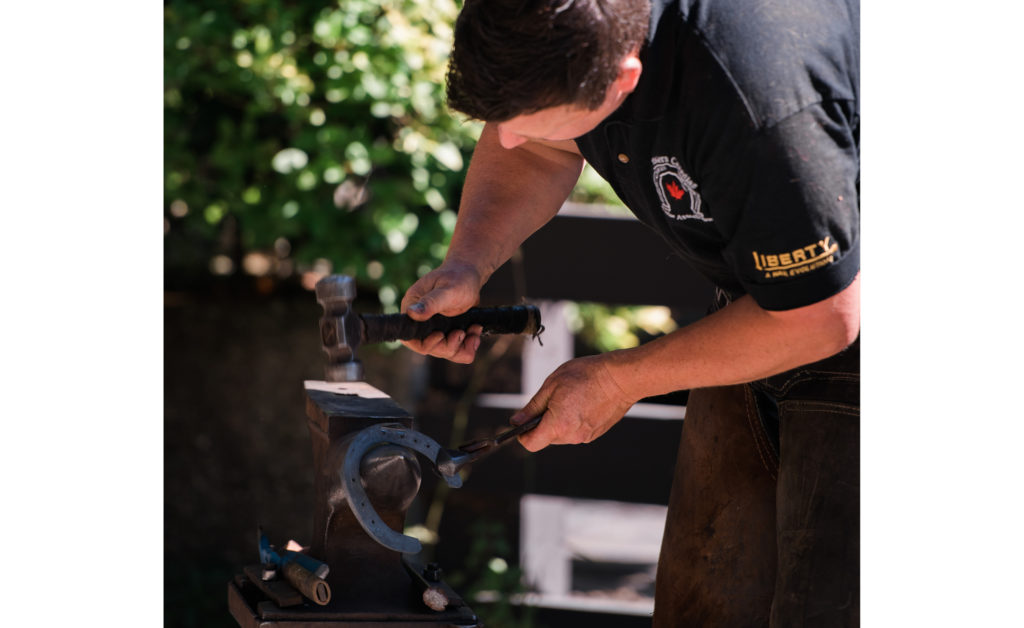by Cassidy Nunn –
The whooshing of the fire in the forge fills the air with its steady hum. Inside the blaze, a piece of steel is being heated, soon to be crafted into the perfect horseshoe.
Ben Yager’s truck, which has been customized to carry the propane-powered forge and all the tools of his farrier and blacksmithing trade, is parked in front of the barn. My horse, Zappa, stands quietly, not fussed by the tings of the hammer hitting the piece of metal on the anvil. The strip of red-hot metal is held between thick tongs and Ben expertly manipulates it with the swing of his hammer, the shape of a horseshoe coming into focus with each tap. He passes the metal back and forth from the forge to the anvil, heating and then shaping, occasionally pressing it against Zappa’s hoof to check it for size.
It’s tough, physical work, but being a blacksmith and farrier has been Ben’s passion since the age of 14 when he got his first job working for a local blacksmith. He’s been running his company for the past 22 years and is a wealth of knowledge when it comes to his trade.
A blacksmith, however, doesn’t necessarily work with horses just as a farrier is not always trained in blacksmithing – confused yet? A blacksmith works with steel and therefore, may choose never to work with horses and solely make creations out of metal (tools, art, etc.). A farrier is a practitioner who works with horses by trimming their hooves, looking after their hoof health and attaching horseshoes (but not necessarily crafting them from a raw material). Some farriers, like Ben, opt to train as a blacksmith as well so that they can make custom horseshoes out of steel.
In the past, when the horse was relied upon for transportation and work, the job of the blacksmith was one of the most important in town. “Traditionally speaking, blacksmiths used to be the go-to for shoeing horses for agriculture and transportation needs, as well as anything else that was needed, from making needles for sewing to scissors, garden tools, tools used in forestry, farming, mining, stonework and the list could go on,” says Ben.
Besides horseshoes, Ben also enjoys the process of forging some of the tools he uses when shoeing horses, such as hammers and tongs. They “have to be a certain weight and have to hold steel securely for the easy manipulation of the metals and heavy working so the farrier’s or blacksmith’s arms, hands, shoulders and back do not get fatigued.” He adds that “handmade blacksmith equipment is often by far superior in strength and quality so there is still a demand for it today even in modern times.”
Nowadays, there are blacksmith and farrier competitions held all over the world and Ben has competed and won in many of these, sometimes on his own and other times as a member of the Canadian Farrier’s team. The competitor will be asked to shoe a particular horse with a specific type of shoe, from scratch, and the event is timed so the pressure is on to be fast but accurate.
Just as Ben was mentored at the beginning of his career, he is now passing on his knowledge to his three current apprentices. He also enjoys teaching clinics and workshops, and while COVID-19 may have put a pause on his competition schedule for the time being, he’s keeping his skills sharp by shoeing his clients horses and working in his home blacksmithing shop. “The best part of blacksmithing I enjoy is simply the history of it and the ability to really form anything from metal upon request.”
After a few more taps from the hammer, Ben is satisfied the shoe is the perfect fit for Zappa; he tosses the metal into a bucket of cold water, which hisses as the steam fills the air. Then he carefully hammers nails through the shoe, securing it to Zappa’s hoof, where it will stay for the next six weeks, until it’s time to trim Zappa’s hooves again and forge his next set of custom horseshoes – and yes, you read that right: my horse gets new shoes more often than I do!
Contact Ben Yager Farrier Service at 250-389-8890.
Photo by Nunn Other Photography.




